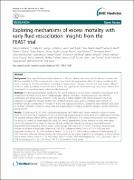Exploring mechanisms of excess mortality with early fluid resuscitation: insights from the FEAST trial
Date
2013Author
Maitland, Kathryn
George, Elizabeth C
Evans, Jennifer
Kiguli, Sarah
Olupot-Olupot, Peter
Akech, Samuel O
Opoka, Robert O
Engoru, Charles
Nyeko, Richard
Mtove, George
Reyburn, Hugh
Brent, Bernadette
Nteziyaremye, Julius
Mpoya, Ayub
Prevatt, Natalie
Dambisya, Cornelius M
Semakula, Daniel
Ddungu, Ahmed
Okuuny, Vicent
Wokulira, Ronald
Otii, Benedict
Levin, Michael
Crawley, Jane
Babiker, Abdel G
Gibb, Diana M
FEAST trial group
Metadata
Show full item recordAbstract
Background: Early rapid fluid resuscitation (boluses) in African children with severe febrile illnesses increases the
48-hour mortality by 3.3% compared with controls (no bolus). We explored the effect of boluses on 48-hour allcause
mortality by clinical presentation at enrolment, hemodynamic changes over the first hour, and on different
modes of death, according to terminal clinical events. We hypothesize that boluses may cause excess deaths from
neurological or respiratory events relating to fluid overload.
Methods: Pre-defined presentation syndromes (PS; severe acidosis or severe shock, respiratory, neurological) and
predominant terminal clinical events (cardiovascular collapse, respiratory, neurological) were described by
randomized arm (bolus versus control) in 3,141 severely ill febrile children with shock enrolled in the Fluid
Expansion as Supportive Therapy (FEAST) trial. Landmark analyses were used to compare early mortality in
treatment groups, conditional on changes in shock and hypoxia parameters. Competing risks methods were used
to estimate cumulative incidence curves and sub-hazard ratios to compare treatment groups in terms of terminal
clinical events.
Results: Of 2,396 out of 3,141 (76%) classifiable participants, 1,647 (69%) had a severe metabolic acidosis or severe
shock PS, 625 (26%) had a respiratory PS and 976 (41%) had a neurological PS, either alone or in combination. Mortality
was greatest among children fulfilling criteria for all three PS (28% bolus, 21% control) and lowest for lone respiratory
(2% bolus, 5% control) or neurological (3% bolus, 0% control) presentations. Excess mortality in bolus arms versus
control was apparent for all three PS, including all their component features. By one hour, shock had resolved
(responders) more frequently in bolus versus control groups (43% versus 32%, P <0.001), but excess mortality with
boluses was evident in responders (relative risk 1.98, 95% confidence interval 0.94 to 4.17, P = 0.06) and ‘nonresponders’
(relative risk 1.67, 95% confidence interval 1.23 to 2.28, P = 0.001), with no evidence of heterogeneity (P =
0.68). The major difference between bolus and control arms was the higher proportion of cardiogenic or shock terminal
clinical events in bolus arms (n = 123; 4.6% versus 2.6%, P = 0.008) rather than respiratory (n = 61; 2.2% versus 1.3%, P =
0.09) or neurological (n = 63, 2.1% versus 1.8%, P = 0.6) terminal clinical events.
Conclusions: Excess mortality from boluses occurred in all subgroups of children. Contrary to expectation,
cardiovascular collapse rather than fluid overload appeared to contribute most to excess deaths with rapid fluid
resuscitation. These results should prompt a re-evaluation of evidence on fluid resuscitation for shock and a reappraisal
of the rate, composition and volume of resuscitation fluids.
Collections
- Research Articles [25]

